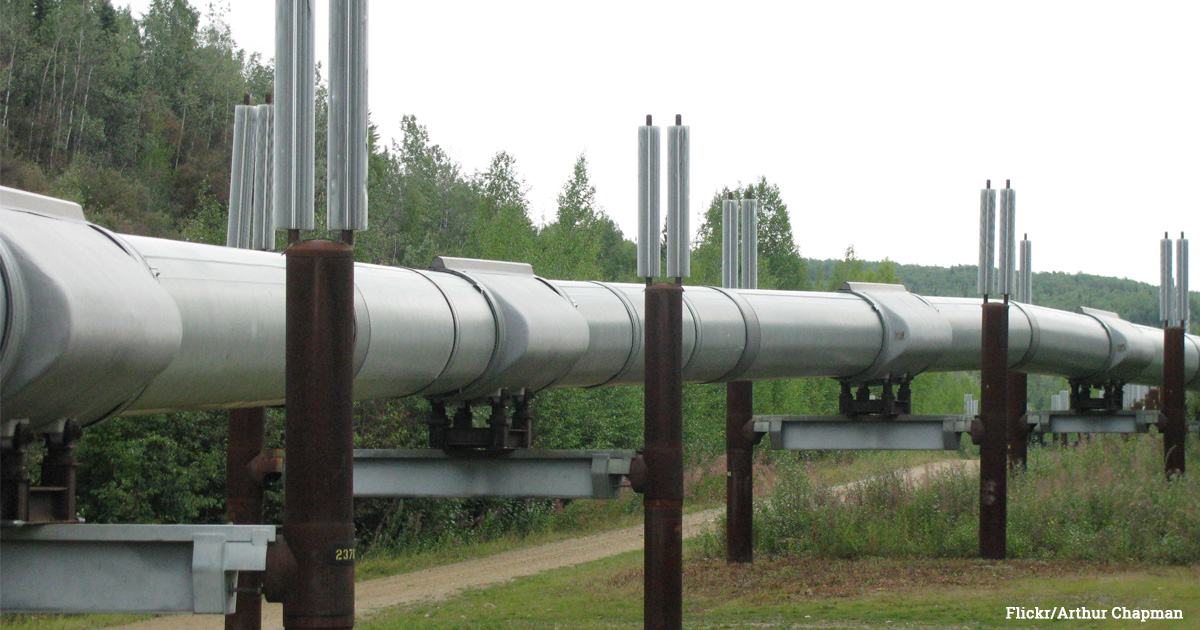This Environmental Crisis in Alaska Highlights an Unseen Problem With Pipelines

By:
A natural gas pipeline in Alaska's Cook Inlet is leaking, and it's raising a debate about harsh weather conditions on pipeline routes.
One of Texas-based energy company Hilcorp's pipelines is leaking between 210,000 and 310,000 cubic feet of gas a day, and the federal government told the company to shut it down. It either has to fix the leak by May or stop the flow of natural gas, according to a March 3 letter from the U.S. Transportation Pipeline and Hazardous Materials Administration, which also found that Hilcorp's inspections of the pipeline are inadequate. The risk to humans is estimated to be low, but state agencies say the leak could harm endangered wildlife in the inlet.
The leak came to Hilcorp's attention on Feb. 7, and a week later helicopter video of the pipeline was published by the Alaska environmental group Inletkeeper. However, the administration's letter said Hilcorp's own analysis found that the leak actually started in December.
The catch? Hilcorp's says it can't repair the pipeline or shut it down.
In a Feb. 20 letter to the Alaska Department of Environmental Conservation, Hilcorp said that it cannot repair the pipeline because "the broken ice, exacerbated by high tidal flows and limited daylight prevent the immediate dispatch of divers to inspect and contain the leak in the pipeline." The company's letter also said it can't shut down the pipeline. The same line was previously used to transport crude oil, and Hilcorp claimed that if it is shut down and depressurized, old crude oil that's still in the line could leak out.
 Flickr/Arthur Chapman - flickr.com
Flickr/Arthur Chapman - flickr.com
Dan Magone, the general manager of Resolve Magone Marine, who has overseen commercial repair diving operations, told Alaska Dispatch News that diving in Cook Inlet with the current weather conditions is too dangerous.
"If ice was the only hazard, you might figure out a plan, but it's not," Magone told ADN. "It is a challenging place to work."
Harsh North Dakota weather conditions also slowed construction of the controversial Dakota Access Pipeline, bringing up concerns about the ability to repair it, if it leaks. The fluid used to lubricate drills freezes between 10 to 20 degrees Fahrenheit, according to Reuters. This would likely force operators to keep the equipment running at all times.
However, some environmental advocates in Alaska allege that Hilcorp won't stop the gas flow because it wants to make money.
"The first thing that Hilcorp needs to do is be a good neighbor, and they need to shut down the pipeline," Bob Shavelson, the advocacy director at Inletkeper told ATTN:. "Of course Hilcorp is inventing all these excuses for why they can't do that because their real motive is to continue pumping and making money."
He said that if the Texas company is truly incapable of shutting down or repairing the pipeline, it shouldn't be doing business in Alaska's Cook Inlet, an extreme and harsh climate for pipelines.
Shavelson said this his 22 year experience in dealing with oil and gas companies is that they will "promise you the moon" but "come up short" if there is a large spill, and it's not fair to the residents that deal with the fallout.
"It's not fair that a corporation can come into Alaska, they can reap incredible subsidies at a time when we're underfunding our seniors, our roads and our schools and yet when there is an environmental accident not shut down the pipeline," he said.
